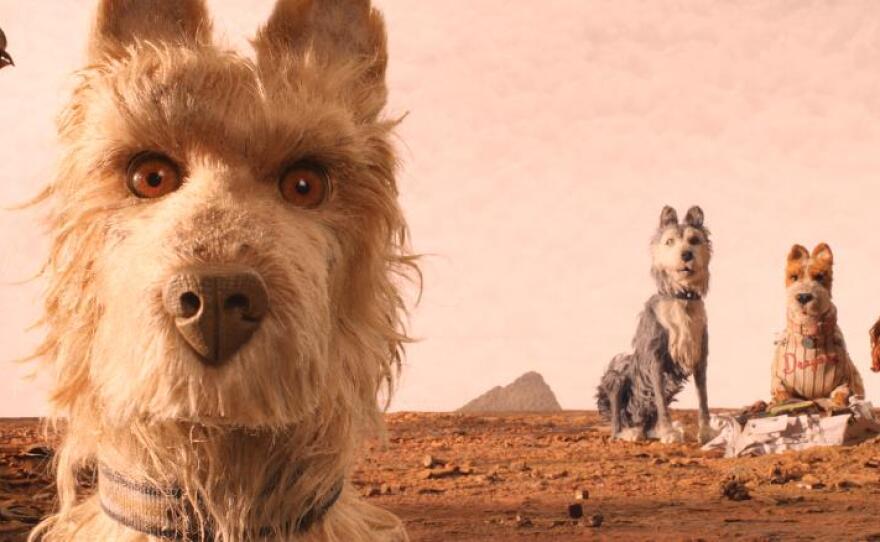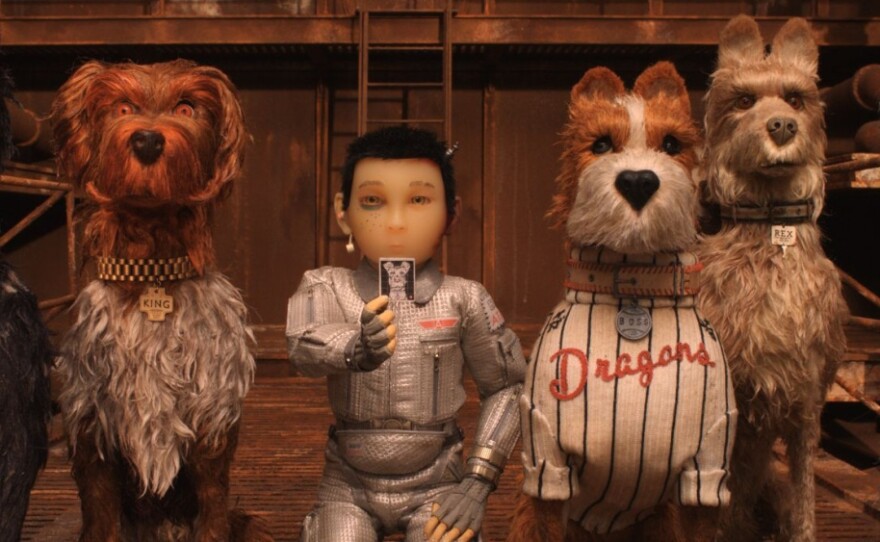It's the Year of the Dog and Wes Anderson’s animated "Isle of Dogs" serves up a fitting tribute to the lovable canines.
Japan boasts one of the most famous dog stories of all time. An Akita named Hachiko waited in the same location every single day for 10 years for his dead master to return. As if to pay homage to that canine loyalty, Wes Anderson sets his new film "Isle of Dogs" in Japan of the near future and tells the story of a young boy on a quest to find his missing pet, Spots.
Spots, along with all the other dogs of Megasaki City, was exiled to Trash Island by an executive decree from the town’s dog-hating Mayor Kobayashi. The mayor has secretly infected dogs with a virus in order to create a climate of fear that will allow him to get rid of the maligned mutts. The vast garbage dump now serves as home to the banished canines who have to fight over scraps of food. Twelve–year-old Atari (voiced with dogged determination by 11-year-old Koyu Rankin) pilots a junior Turboprop plane to the island where he enlists the help of a pack of dogs led by Chief, (wonderfully voiced by Bryan Cranston) to find his beloved pooch.
Jeff Goldblum on voicing a dog
Actor Jeff Goldblum voices the character of Duke, a gossiping mutt.
"I don’t like talking animals so much," he confessed by phone. "I like Mr. Ed. I like the Wes Anderson version of animals where they are kind of like smart interesting people with recognizably people personalities."
And recognizable as Wes Anderson creations. Part of the humor arises from the fact that Anderson shoots these dog puppets with the same whimsy and precision that he shoots any of his human actors. Goldblum sees his character and all the dogs in Duke’s pack as heroically and sweetly committed to the task of reuniting this young boy and his dog.
"They are all sort of working on the same page in terms of their sweetness and their willingness to risk their lives for this boy," Goldblum said. "They love this boy who loves his dog and they want to reunite them and I love that spine of the character, I think they are deeply loving and sweet characters."
Stop motion animation
What makes them even more endearing is they’re rendered in a stop motion animation style that harkens back to Willis O’Brien’s brilliant work on "King Kong," and anything by Ray Harryhausen. Goldblum notes that he only took a few hours to record his lines for the film but then the animators worked for three years bringing Duke and all the other characters to vivid life. That means animating every hair and every breath.
"They are following your breath and breathing and thinking and if you take a pause they fill in and depict what you must be thinking and doing during that pause in kind of a beautiful way so they are working with the voice in a very talented way," Goldblum explained.
Such precision craftsmanship is also evident in Anderson’s writing and directing.
Wes Anderson's precise style
"He is a great combination of someone who is very meticulous like the way the Coen brothers are in relation to dialogue, and Aaron Sorkin, or if you do a David Mamet play as I have done. You have to render the words verbatim and have to try to make it sound like you are making them up. And he is in my experience something like that," Goldblum said. "I remember in 'Grand Budapest Hotel,’ I had a big speech and I had been working on it conscientiously and after the first or second take he said you know you’re changing, and this is literally what he said, you are changing this 'an' to a 'the' or maybe it was a 'the' to an 'an.' And I said I know but I’m not just doing this carelessly, here’s why I think it feels right to me and he said I understand what you’re talking about but can you please do it the other way and I said okey-dokey but having said that, within his sort of bulls eye he has beautifully struck, already it feels collaborative and free and you do many takes often times and within this little sort of idea that he’s got, which is really a big idea, you get to play and it feels like a great actor’s director and he gives you ideas how to nuance it."
Goldblum said it was a fun process and was surprised how all the elements ultimately came together.
"I was surprised how funny it was and how moved I was and how culturally relevant it is now with anti-fear mongering and anti-bigotry and pro-student uprising and how it indicts a corrupt political faction that will deny science for the purposes of their own nefarious profit-making."
Is the film guilty of cultural appropriation?
Some are criticizing the film for being culturally insensitive in how it appropriates Japanese culture.
It’s unfortunate that Wes Anderson decided to set “Isle of Dogs” in Japan. He admitted the story could have been set anywhere but for a white filmmaker to set a tale in Japan and to have a white girl end up being the hero is problematic at a time of heightened sensitivity to cultural appropriation and a lack of diversity on screen. And that’s too bad because Anderson's story of a boy in search of his lost dog is a charmingly appealing one and even more enchanting as it’s been rendered in painstakingly beautiful stop motion animation.
I have to confess I am enamored with the animation style of "Isle of Dogs" that I almost don’t care about anything else because it completely transports me to another world. This is true cinema magic and Anderson, as he showed in "Fantastic Mr. Fox," has a true genius for making these puppets come to magical life.
But is his film racist? I don't think so. Is it racially insensitive? Yes, but unintentionally so. Anderson has an obvious love of Japanese cinema and culture.
In interviews he has stated: “our big inspiration with the movie was to make it about what we loved in Japanese cinema and it grew into something more to do with all kinds of Japanese culture and our enthusiasm for it.”
He even brought in Kunichi Nomura as a co-writer to ensure that there was a Japanese perspective included in the creative team.

But Anderson's insensitivity comes from him living a rather insular life (he's kind of the poster boy for white, privileged male filmmaker) and simply not thinking things through and not realizing how in our particularly sensitized times some of his choices might play out. Take for example having the dog barks translated into English and voiced by white American actors while the Japanese characters speak their native language and their dialogue is not subtitled. In terms of the story, this is a perfect way to humanize the dogs and make them more accessible to an American audience. The dogs sound like us so we empathize with them and their plight. That’s a perfectly reasonable and effective narrative device.
But when you have these dogs voiced by white actors banished to a trash island because the Japanese mayor wants to see the species eradicated; there’s a troublesome lack of cultural awareness about how that plays out with the history of Americans interning Japanese during World War II out of fear and racism.
None of this would have been an issue if Anderson had made Manhattan the isle the dogs were banished to and if the dogs spoke English and the humans spoke in unsubtitled wah-wah sounds like the adults spoke in the Peanuts cartoon.
But to say, as some critics have, that Anderson dehumanizes the Japanese characters is willfully blind to how much care and attention he devotes to Atari and the young boy’s heroic search for his dog. It is Atari and the dogs who win us over completely.
Anderson has always created worlds built around his own peculiar quirkiness and featuring characters wrapped up in their own neuroses and anxieties. He doesn’t make films about the real world but rather about a universe of his own making. Everything he depicts of Japan and its culture in "Isle of Dogs" is rendered with the affection of someone who loves the country but seems to only know of it through films and pop culture. So it is not a realistic view but more like an imagined world.
What Anderson is guilty of is a naiveté that blinds him to how his choices as a privileged white male filmmaker might seem to underrepresented groups. As a dog lover and fan of stop motion animation, I appreciate "Isle of Dogs" for its meticulous craft and artistry and for giving us a pack of dogs and brave little boy that are irresistible. I'm actually surprised cat lovers haven't come out and condemned the film for it negative portrayal of felines.







